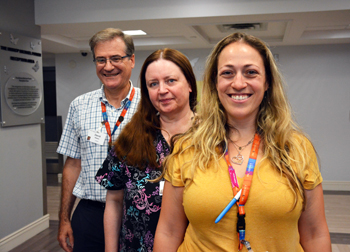Celebrating how Interprofessional Practice supports better care for all

By Emily Dawson
Sept. 26, 2019 – Across Unity Health Toronto, our patients, residents and clients benefit every day from our shared commitment to an interprofessional practice approach to care. This year, Unity Health is celebrating its first network-wide Interprofessional Practice Week from Sept. 21 to 27 and showcasing some of the exceptional work happening at our sites.
An interprofessional approach helps us create better patient care and experiences by leveraging the expertise of diverse professions. It builds respect and trust among teams and creates a culture of support in both challenging situations and when celebrating collective success.
We sat down with team members from two Unity Health programs to talk about the positive impact of their interprofessional model.

(l to r) Chaplain David Rebelo, registered practical nurse Joyce Boyer and rehabilitation assistant Deanna Larizza.
In Providence Healthcare’s Palliative Care program, rehabilitation assistant Deanna Larizza, chaplain David Rebelo and registered practical nurse Joyce Boyer collaborate to provide physical, emotional and spiritual care for patients and families – and each other – through their holistic end-of-life care.
The group works together on a daily basis to customize care for patients. They also have twice-weekly structured interprofessional team meetings.
Every morning, Larizza and Boyer connect about one particular patient who has been on the unit for a couple of months now. He used to get up every day but he’s declined to the point of getting out of bed only two or three times per week.
“After I’ve provided his morning care, Deanna will ask me how he’s doing mentally and physically. The day might not be going so well for him to be able to get out of bed. But we work together to prepare him for a positive day, as much as we can,” said Boyer.
“Likewise, when he does get up, we will set him up in the lounge to watch his TV stations. We will both check on him throughout the day in the lounge, and he prompts us to bring him back to his room for a rest or ensuring that he has what he needs,” added Larizza.
Rebelo is another important member of the interprofessional team. He encourages patients to use their own spiritual, psychological and emotional resources to help them cope. Nurses and other team members will often identify patients who are struggling, fearful or anxious, and will invite them to meet with Rebelo.
Rebelo believes the team benefits from a shared understanding of the challenges of working in palliative care and by the support people offer each other in times of distress.
“Last week, we came together to support and welcome back a team member who was returning to work after losing someone in her family. We are a very cohesive group. We’re aware of each other’s needs and take time to acknowledge those,” he said.
Added Boyer: “We inspire positivity with each other because of the respect we have among the team.”

(l to r) Therapeutic recreationist Sydney Ferguson, occupational therapist Michelle Lau and registered dietitian Fenny Dulay-Hill.
St. Joseph’s Reactivation Care Centre – Church unit (RCC) opened in May. Housed in North York – just a short drive from St. Joseph’s Health Centre – the unit is designed to help patients prepare to go back home, to rehab or to another care location.
Its newly formed interprofessional team has quickly bonded to provide high quality care in this unique setting. Occupational therapist Michelle Lau, registered dietitian Fenny Dulay-Hill and therapeutic recreationist Sydney Ferguson have demonstrated how their trust in each other has led to better outcomes for their patients.
“Every team member brings a different therapeutic lens to address our patients’ needs and goals, bringing their own experience and expertise to the table as one piece in a complex puzzle,” said Lau.
“We’re committed to the same goals to improve patients’ strength and promote their independence to help them successfully transition to the next phase in their journey.”
The team described one patient who benefited from this approach.
“When he was first transferred to the RCC, he was very private and isolated himself in his room. We noticed that he preferred to engage in solitary activities or one-on-one therapeutic programs,” said Ferguson.
“He was not overly motivated and his progression was slow. We discovered through Sydney’s interview with him that he enjoys food-based social programs and music. So, with Michelle and Fenny, we collaborated to brainstorm food-based programs, such as ice cream socials, that we could use to motivate him to participate, and encouraged him to walk to the activity room to attend.”
To support the team’s overall plan, Dulay-Hill worked with him to incorporate food preferences and nutrition supplements into his meal plan.
“Together, we recognized that he required optimal nutrition to gain physical strength and energy to walk and participate in therapeutic activities,” said Dulay-Hill.
